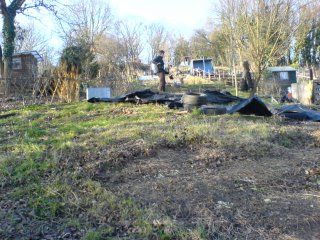
We’ve got early blight on our potatoes. This seems a little unfair, as nobody else on our allotment site has it.
If it spreads to our tomatoes, we’re in trouble.
In which we attempt to grow vegetables on the side of a hill in South London
 Tesco, our favourite supermarket, sells an excellent range of new potatoes, but they’re not a patch on ones you’ve dug up yourself and cooked the same day.
Tesco, our favourite supermarket, sells an excellent range of new potatoes, but they’re not a patch on ones you’ve dug up yourself and cooked the same day.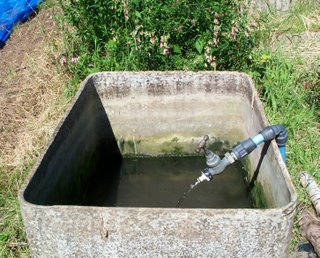 Summer has arrived! It’s hot, it’s dry, and the nation is outdoors applying sun block.
Summer has arrived! It’s hot, it’s dry, and the nation is outdoors applying sun block.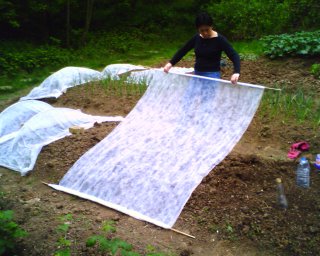 In the soil:
In the soil: The organic vegetable grower is annoyed by a variety of small monsters. In the foreground, horticultural fleece covers the pak choi and spinach, to prevent flea beetle from punching holes in them. To the right a fleece thwarts the carrot fly. To the rear, more fleece protects our peas from birds, mice, and the pea moth.
The organic vegetable grower is annoyed by a variety of small monsters. In the foreground, horticultural fleece covers the pak choi and spinach, to prevent flea beetle from punching holes in them. To the right a fleece thwarts the carrot fly. To the rear, more fleece protects our peas from birds, mice, and the pea moth.
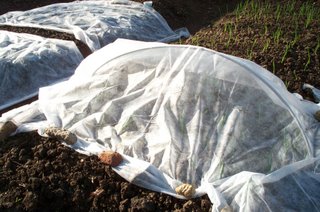
 Now nematodes are a fairly new, organic and biological slug control. Basically they are microscopic worms and you water them into your soil and they get inside the slugs and kill them. They are only harmful to slugs and should a bird eat the nematode ridden slug, they will not be affected. We are using a brand called Nemaslug as recommended by Sarah Raven.
Now nematodes are a fairly new, organic and biological slug control. Basically they are microscopic worms and you water them into your soil and they get inside the slugs and kill them. They are only harmful to slugs and should a bird eat the nematode ridden slug, they will not be affected. We are using a brand called Nemaslug as recommended by Sarah Raven.
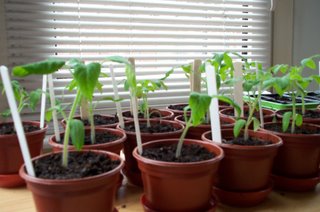 Before we left for our adventures in Dubai, we planted some tomato seeds. We planted four varieties: Sungold, Gardener’s Delight, Brandywine and Sub-Arctic. These were chosen as lots of books have told us that they are tasty. We put them into small pots with compost at first and wrapped the whole lot in newspaper and left them next to the radiator. According to Sarah Raven’s The Great Vegetable Plot, you then have to wait a few days for them to germinate and then when they show any signs of life, you should take off the cover and put them in full sunlight which is what we did. They sprouted magnificently and then we had to leave them whilst we went to Dubai, hoping that they wouldn’t die whilst we were away. We came back and found that they hadn’t died. Huzzah!
Before we left for our adventures in Dubai, we planted some tomato seeds. We planted four varieties: Sungold, Gardener’s Delight, Brandywine and Sub-Arctic. These were chosen as lots of books have told us that they are tasty. We put them into small pots with compost at first and wrapped the whole lot in newspaper and left them next to the radiator. According to Sarah Raven’s The Great Vegetable Plot, you then have to wait a few days for them to germinate and then when they show any signs of life, you should take off the cover and put them in full sunlight which is what we did. They sprouted magnificently and then we had to leave them whilst we went to Dubai, hoping that they wouldn’t die whilst we were away. We came back and found that they hadn’t died. Huzzah!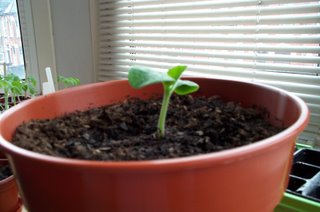 When we planted the tomato seeds, we also planted a seed from a butternut squash that we had bought from Tesco’s. Amy didn’t think that it would grow but she was wrong and it is growing very well. It has been put in a big pot after the initial germination as squashes don’t like root disturbance.
When we planted the tomato seeds, we also planted a seed from a butternut squash that we had bought from Tesco’s. Amy didn’t think that it would grow but she was wrong and it is growing very well. It has been put in a big pot after the initial germination as squashes don’t like root disturbance.

 Things are starting to show signs of life. Our strawberry plants, which looked dead when we put them in the soil, are putting out new leaves every week. The raspberry canes have produced some small buds, and the tomatoes we sowed a few days ago have produced their first seedling.
Things are starting to show signs of life. Our strawberry plants, which looked dead when we put them in the soil, are putting out new leaves every week. The raspberry canes have produced some small buds, and the tomatoes we sowed a few days ago have produced their first seedling.

 Somebody stole one of our bags of compost.
Somebody stole one of our bags of compost. We have a very amusing book by Dr D. G. Hessayon called “The Vegetable & Herb Expert”, which is essential reading if you aspire to be old-fashioned. (“People who claim that they never need to spray [pesticides] are lying, lucky or living on poor vegetables.”)
We have a very amusing book by Dr D. G. Hessayon called “The Vegetable & Herb Expert”, which is essential reading if you aspire to be old-fashioned. (“People who claim that they never need to spray [pesticides] are lying, lucky or living on poor vegetables.”)
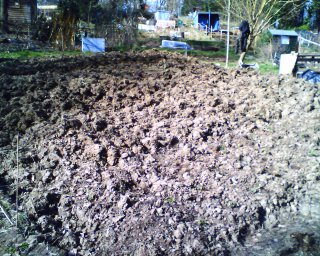 We’ve finished digging! Shame – it was quite fun.
We’ve finished digging! Shame – it was quite fun.
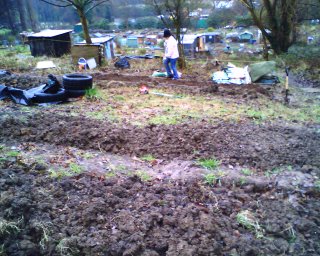 Some of parts of the soil look like they’ll produce quite good crops, but other parts would look more at home in a pottery class. We need to add some organic matter to bulk it out. Unfortunately we didn’t have any, so we popped down to the garden centre to buy a few bags of compost.
Some of parts of the soil look like they’ll produce quite good crops, but other parts would look more at home in a pottery class. We need to add some organic matter to bulk it out. Unfortunately we didn’t have any, so we popped down to the garden centre to buy a few bags of compost. One of our books tells us that the best thing to do, when you have a new allotment that’s a bit of a mess, is not to try to tackle it all in one go, or you will become disheartened – just get to grips with a small area, and get the land into shape gradually.
One of our books tells us that the best thing to do, when you have a new allotment that’s a bit of a mess, is not to try to tackle it all in one go, or you will become disheartened – just get to grips with a small area, and get the land into shape gradually.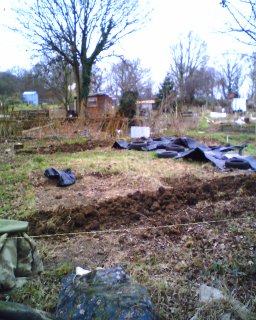
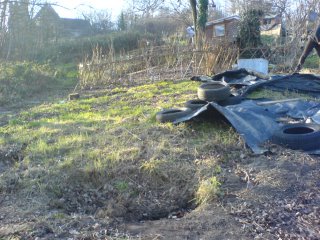 We got the alloment a few weeks ago and it didn't look like much to start with. There was a lot of old carpet covering the plot which had shed a lot of backing onto the soil. This wasn't too hard to pick up and the good thing is that it kept the soil warm and due to light deprivation, it killed all the weeds.
We got the alloment a few weeks ago and it didn't look like much to start with. There was a lot of old carpet covering the plot which had shed a lot of backing onto the soil. This wasn't too hard to pick up and the good thing is that it kept the soil warm and due to light deprivation, it killed all the weeds.